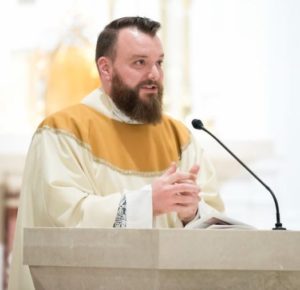 Dear Brothers and Sisters in Christ,
Dear Brothers and Sisters in Christ,
I have made no secret of my preference to celebrate feast days on their proper calendar days, rather than moving them to a nearby Sunday. This weekend, we mark the liturgical celebration of the Epiphany of the Lord. Normally, though, Epiphany ought to be celebrated on January 6. For some reason, in the United States, this crowning of the Christmas celebrations is transferred to the Sunday after the solemnity of Mary the Mother of God. Of course, transferring the feast deprives us of the full twelve days of Christmas! January 6 is the twelfth day of Christmas and by transference to an earlier day, the symbolism is lost. Epiphany celebrated on January 6 helps us understand the idea of Christmas as a liturgical season. Further, it highlights the mystery of the Incarnation and sets the tone for the rest of the liturgical year. First Jesus is born and the news of His birth is brought to Israelites. Twelve days later (twelve being a symbolic number in Scripture indicating fullness), the Epiphany is celebrated, a day on which Jesus is manifested to all the nations, all the peoples of the world, personified by the three wise men. In the fullness of time, God becomes incarnate, and by the Incarnation means to reveal Himself not only to the Chosen People Israel, but also to the whole world. The implication of this fact charges all believers to go on mission, to manifest Christ to the world, to be a light to all nations, to prolong Christ’s presence on earth by our prayer, work, and action! For these reasons, I object to the transference of Epiphany away from January 6. That said, I want the beauty of this feast to inspire us to mission!
From the earliest days of Scriptural history, we see God’s revelation to the Jewish people. This chosen nation is set apart, not simply for special favor, but also as a witness to the world. The coming of the Messiah was long foretold. To and through His chosen people, God would send a savior, a Messiah, who would free that nation from bondage in slavery, free them from sin, reconcile them, and bring about the reign of God. And so the birth of Jesus is the fulfillment of those long spoken prophecies. The prophets spoke to the Jewish people, the birth of the Messiah takes place in the land promised to them by God, in the city of David, the greatest of their kings. The birth of the Messiah, in other words, happens in a distinctly Jewish context and culture. Those who first witness it are themselves Israelites, members of God’s holy nation. But something often overlooked in the prophecies must be fulfilled as well. That is, the Messiah comes to gather not only the twelve tribes of Israel, but all the nations of the world. The twelve tribes receive the Messiah first, but (liturgically) twelve days later, the nations will receive Him as well. The twelve tribes are the fullness of God’s people, but the twelve days is the fullness of time, and in this fullness, God reveals His plan more completely and perfectly, the full depth of the prophecies becomes clear. Thus, the magi coming from the East, from that land beyond the known world of Israel, also fulfill the plan foretold. The wise men come, following a star. They do not have the benefit of God’s revelation given in Scripture or in the Jewish traditions. They have no Temple in which to worship. Yet, even from the natural world around them they recognize that God is calling. Jesus is manifested as Messiah both to Israel and to the whole world.
Whenever we mark the mystery of the Epiphany, which comes from the Greek word meaning “revelation from above,” we are reminded of the identity of that child born in Bethlehem. Jesus is the Messiah, the salvation of Israel, the savior of all nations. This feast reminds us that we have received the gift of revelation, the story has been entrusted to us. We bear the responsibility of both the Jews and the Magi. The shepherds were sent in haste to Bethlehem to worship and do homage, and so we are sent, week after week, day after day, to bring our worship to the Lord. The Magi encountered Jesus and His light flooded their lives, and they went home by another way, went home transformed by this mystical encounter. Just so are we to return from our worship transformed. Just so are we sent home from our encounter with the Lord Jesus so that, as we travel, as we work, as we live in this world, we might manifest the saving love and power of Jesus to the nations. With all that in mind, it may seem a small thing to worry if Epiphany is January 6 or some other day. And maybe it is. Or maybe we need the reminder that Jesus not only reveals Himself to us, his chosen people, but in the fullness of time, through our witness, desires to reveal Himself to every nation on earth.
Peace,

Fr. Sam


